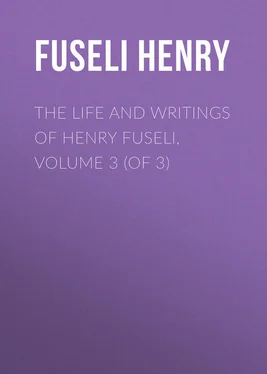Henry Fuseli - The Life and Writings of Henry Fuseli, Volume 3 (of 3)
Здесь есть возможность читать онлайн «Henry Fuseli - The Life and Writings of Henry Fuseli, Volume 3 (of 3)» — ознакомительный отрывок электронной книги совершенно бесплатно, а после прочтения отрывка купить полную версию. В некоторых случаях можно слушать аудио, скачать через торрент в формате fb2 и присутствует краткое содержание. Жанр: visual_arts, foreign_antique, foreign_prose, на английском языке. Описание произведения, (предисловие) а так же отзывы посетителей доступны на портале библиотеки ЛибКат.
- Название:The Life and Writings of Henry Fuseli, Volume 3 (of 3)
- Автор:
- Жанр:
- Год:неизвестен
- ISBN:нет данных
- Рейтинг книги:5 / 5. Голосов: 1
-
Избранное:Добавить в избранное
- Отзывы:
-
Ваша оценка:
- 100
- 1
- 2
- 3
- 4
- 5
The Life and Writings of Henry Fuseli, Volume 3 (of 3): краткое содержание, описание и аннотация
Предлагаем к чтению аннотацию, описание, краткое содержание или предисловие (зависит от того, что написал сам автор книги «The Life and Writings of Henry Fuseli, Volume 3 (of 3)»). Если вы не нашли необходимую информацию о книге — напишите в комментариях, мы постараемся отыскать её.
The Life and Writings of Henry Fuseli, Volume 3 (of 3) — читать онлайн ознакомительный отрывок
Ниже представлен текст книги, разбитый по страницам. Система сохранения места последней прочитанной страницы, позволяет с удобством читать онлайн бесплатно книгу «The Life and Writings of Henry Fuseli, Volume 3 (of 3)», без необходимости каждый раз заново искать на чём Вы остановились. Поставьте закладку, и сможете в любой момент перейти на страницу, на которой закончили чтение.
Интервал:
Закладка:
With regard to ourselves, the barbarous, though then perhaps useful rage of image-breakers in the seventeenth century, seems much too gratuitously propagated as a principle in an age much more likely to suffer from irreligion than superstition. A public body inflamed by superstition, suffers, but it suffers from the ebullitions of radical heat, and may return to a state of health and life; whilst a public body plunged into irreligion, is in a state of palsied apathy, the cadaverous symptom of approaching dissolution. Perhaps neither of these two extremes may be precisely our own state; we probably float between both. But surely in an age of inquiry and individual liberty of thought , when there are almost as many sects as heads, there was little danger that the admission of Art to places of devotion could ever be attended by the errors of idolatry; nor have the motives which resisted the offer of ornamenting our churches perhaps any eminent degree of ecclesiastic or political sagacity to recommend them. Who would not rejoice if the charm of our Art, displaying the actions and example of the sacred Founder of our religion and of his disciples in temples and conventicles, contributed to enlighten the zeal, stimulate the feelings, sweeten the acrimony, or dignify the enthusiasm of their respective audiences? The source of the grand monumental style of Greece was Religion with Liberty. At that period the artist, as Pliny expresses himself, was the property of the public, or in other words, he considered himself as responsible for the influence of his works on public principle: with the decline of Religion and Liberty his importance and the Art declined; and though the Egyptian custom of embalming the dead and suffering the living to linger had not yet been adopted, from the organ of the public he became the tool of private patronage; and private patronage, however commendable or liberal, can no more supply the want of general encouragement, than the conservatories and hotbeds of the rich, the want of a fertile soil or genial climate. Luxury in times of taste keeps up execution in proportion as it saps the dignity and moral principle of the Art; gold is the motive of its exertions, and nothing that ennobles man was ever produced by gold. When Nero transported the Pontic Apollo to the golden house, and furnished the colossal shoulders of the god with his own head, Sculpture lent her hand to legitimate the sacrilege: why should Painting be supposed to have been more squeamish when applied to decorate the apartments of his pleasures and the cabinet of Poppæa with Milesian pollutions, or the attitudes of Elephantis?
The effect of honours and rewards has been insisted on as a necessary incentive to artists: they ought indeed to be, they sometimes are, the result of superior powers; but accidental or partial honours cannot create Genius, nor private profusion supply public neglect. No genuine work of Art ever was or ever can be produced, but for its own sake; if the artist do not conceive to please himself, he never will finish to please the world. Can we persuade ourselves that all the treasures of the globe could suddenly produce an Iliad or Paradise Lost, or the Jupiter of Phidias, or the Capella Sistina? Circumstances may assist or retard parts, but cannot make them: they are the winds that now blow out a light, now animate a spark to conflagration. Nature herself has set her barriers between age and age, between genius and genius, which no mortal overleaps; all attempts to raise to perfection at once, what can only be reared by a succession of epochs, must prove abhortive and nugatory: the very proposals of premiums, honours, and rewards to excite talent or rouse genius, prove of themselves that the age is unfavourable to Art; for, had it the patronage of the public, how could it want them?
We have now been in possession of an Academy more than half a century; all the intrinsic means of forming a style alternate at our commands; professional instruction has never ceased to direct the student; premiums are distributed to rear talent and stimulate emulation, and stipends are granted to relieve the wants of genius and finish education. And what is the result? If we apply to our Exhibition, what does it present, in the aggregate, but a gorgeous display of varied powers, condemned, if not to the beasts, at least to the dictates of fashion and vanity? What therefore can be urged against the conclusion, that, as far as the public is concerned, the Art is sinking, and threatens to sink still deeper, from the want of demand for great and significant works? Florence, Bologna, Venice, each singly taken, produced in the course of the sixteenth century alone, more great historic pictures than all Britain taken together, from its earliest attempts at painting to its present efforts. What are we to conclude from this? that the soil from which Shakspeare and Milton sprang, is unfit to rear the Genius of Poetic Art? or find the cause of this seeming impotence in that general change of habits, customs, pursuits, and amusements, which for near a century has stamped the national character of Europe with apathy or discountenance of the genuine principles of Art?
But if the severity of these observations, this denudation of our present state moderates our hopes, it ought to invigorate our efforts for the ultimate preservation, and, if immediate restoration be hopeless, the gradual recovery of Art. To raise the Arts to a conspicuous height may not perhaps be in our power; we shall have deserved well of posterity if we succeed in stemming their farther downfall, if we fix them on the solid base of principle. If it be out of our power to furnish the student's activity with adequate practice, we may contribute to form his theory; and Criticism founded on experiment, instructed by comparison, in possession of the labours of every epoch of Art, may spread the genuine elements of taste, and check the present torrent of affectation and insipidity.
This is the real use of our Institution, if we may judge from analogy. Soon after the middle of the sixteenth century, when the gradual evanescence of the great luminaries in Art began to alarm the public, an idea started at Florence of uniting the most eminent artists into a society, under the immediate patronage of the Grand Duke, and the title of Academy: it had something of a Conventual air, has even now its own chapel, and celebrates an annual festival with appropriate ceremonies; less designed to promote than to prevent the gradual debasement of Art. Similar associations in other places were formed in imitation, and at the time of the Carracci even the private schools of painters adopted the same name. All, whether public or private, supported by patronage or individual contribution, were and are symptoms of Art in distress, monuments of public dereliction and decay of Taste. But they are at the same time the asylum of the student, the theatre of his exercises, the repositories of the materials, the archives of the documents of our art, whose principles their officers are bound now to maintain, and for the preservation of which they are responsible to posterity, undebauched by the flattery, heedless of the sneers, undismayed by the frown of their own time.
Permit me to part with one final observation. Reynolds has told us, and from him whose genius was crowned with the most brilliant success during his life, from him it came with unexampled magnanimity, "that those who court the applause of their own time, must reckon on the neglect of posterity." On this I shall not insist as a general maxim; all depends on the character of the time in which an artist lives, and on the motive of his exertions. M. Agnolo, Raffaello, Tiziano, and Vasari, Giuseppe d'Arpino, and Luca Giordano, enjoyed equal celebrity during their own times. The three first enjoy it now, the three last are forgotten or censured. What are we to infer from this unequal verdict of posterity? What, but what Cicero says, that time obliterates the conceits of opinion or fashion, and establishes the verdicts of Nature? The age of Julio and Leone demanded genius for its own sake, and found it – the age of Cosmo, Ferdinand, and Urban, demanded talents and dispatch to flatter their own vanity, and found them too; but Cosmo, Ferdinand, and Urban, are sunk in the same oblivion, or involved in the same censure with their tools – Julio and Leone continue to live with the permanent powers which they had called forth.
Читать дальшеИнтервал:
Закладка:
Похожие книги на «The Life and Writings of Henry Fuseli, Volume 3 (of 3)»
Представляем Вашему вниманию похожие книги на «The Life and Writings of Henry Fuseli, Volume 3 (of 3)» списком для выбора. Мы отобрали схожую по названию и смыслу литературу в надежде предоставить читателям больше вариантов отыскать новые, интересные, ещё непрочитанные произведения.
Обсуждение, отзывы о книге «The Life and Writings of Henry Fuseli, Volume 3 (of 3)» и просто собственные мнения читателей. Оставьте ваши комментарии, напишите, что Вы думаете о произведении, его смысле или главных героях. Укажите что конкретно понравилось, а что нет, и почему Вы так считаете.












